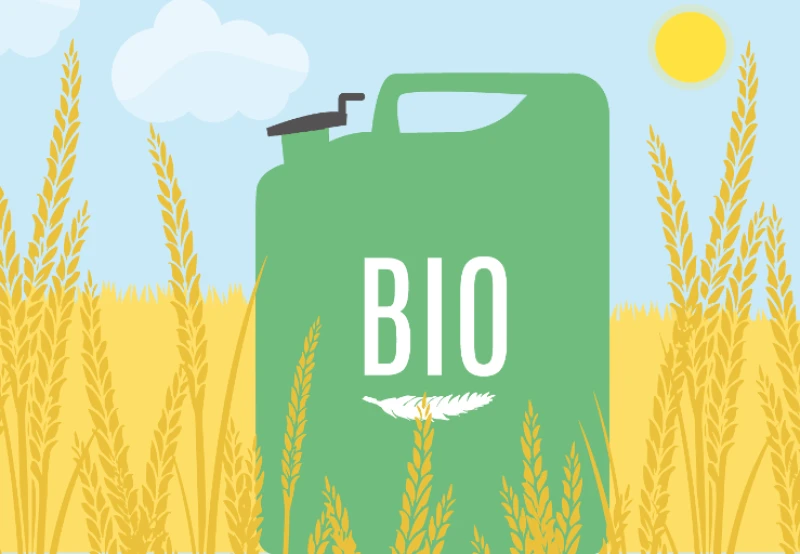Genetically engineered biofuels might be able to compete with gasoline ‘within reach’
Genetically engineered biofuels might be able to compete with gasoline ‘within reach’


Berkeley Laboratory scientists designed simulations to determine how much biofuel is needed for the whole bioproduct extraction process to be labeled as cost-efficient. Their results showed that the target levels are actually modest and within reach.
The development of biofuels over the past years is part of the strategy to decrease the demand for petroleum-based gasoline, diesel, and jet fuels. However, biofuels are yet to reach the level where they can compete with petroleum-based fuels in terms of cost production. Conventional biofuel production often involves genetically engineered plants that can produce essential chemical compounds, or bioproducts.
These bioproducts are extracted from the plant, and the remaining plant parts are converted into fuel. This led scientists from the Berkeley Laboratory to investigate exactly how much bioproduct does a plant need to determine if the whole extraction process to be determined efficient, and how much bioproduct should be produced to reach the target ethanol selling price of USD 2.50 per gallon.
To do this, the researchers studied existing data of well-studied plant-based bioproduct production. They used this data to make simulations that will determine the factors involved in extracting bioproducts using the context of bioethanol refinery, which means that bioproducts will be extracted from the plant and the remaining plant materials will be converted to ethanol.
Their results determined that the bioproduct levels needed to accumulate in plants to offset the production cost recovery is quite feasible. Using limonene as an example, they calculated that an accumulated 0.6% of biomass dry weight would already produce net economic benefits to biorefineries. To illustrate, it means harvesting 10 dry metric tons of sorghum mass from one acre will only need 130 pounds of recovered limonene from that biomass to say that the whole production process is efficient.
According to the scientists, this new finding can provide new insights into the role of bioproducts to improve biorefinery economics. The results also offer the first quantitative basis for implementation of this cost-saving strategy for future studies on plant-based biofuel breeding and engineering. The scientists also recommended that crops need to be engineered to produce a broad range of bioproducts in order to provide options and diversify products in the market.
Read the original post

 | Videos | More... |

Video: Nuclear energy will destroy us? Global warming is an existential threat? Chemicals are massacring bees? Donate to the Green Industrial Complex!
 | Bees & Pollinators | More... |

GLP podcast: Science journalism is a mess. Here’s how to fix it

Mosquito massacre: Can we safely tackle malaria with a CRISPR gene drive?

Are we facing an ‘Insect Apocalypse’ caused by ‘intensive, industrial’ farming and agricultural chemicals? The media say yes; Science says ‘no’
 | Infographics | More... |

Infographic: Global regulatory and health research agencies on whether glyphosate causes cancer
 | GMO FAQs | More... |

Why is there controversy over GMO foods but not GMO drugs?

How are GMOs labeled around the world?

How does genetic engineering differ from conventional breeding?
 | GLP Profiles | More... |

Alex Jones: Right-wing conspiracy theorist stokes fear of GMOs, pesticides to sell ‘health supplements’




 California, Washington, Oregon forge immunization alliance to safeguard vaccine access against federal undermining
California, Washington, Oregon forge immunization alliance to safeguard vaccine access against federal undermining Fighting deforestation with CO2: Biotechnology breakthrough creates sustainable palm oil alternative for cosmetics
Fighting deforestation with CO2: Biotechnology breakthrough creates sustainable palm oil alternative for cosmetics Trust issues: What happens when therapists use ChatGPT?
Trust issues: What happens when therapists use ChatGPT? 30-year-old tomato line shows genetic resistance to devastating virus
30-year-old tomato line shows genetic resistance to devastating virus Viewpoint — Fact checking MAHA mythmakers: How wellness influencers and RFK, Jr. undermine American science and health
Viewpoint — Fact checking MAHA mythmakers: How wellness influencers and RFK, Jr. undermine American science and health The free-range chicken dilemma: Better for birds, but with substantial costs
The free-range chicken dilemma: Better for birds, but with substantial costs Viewpoint: Video — Big Solar is gobbling up productive agricultural land and hurting farmers yet providing little energy or sustainabilty gains
Viewpoint: Video — Big Solar is gobbling up productive agricultural land and hurting farmers yet providing little energy or sustainabilty gains ‘You have to treat the brain first’:Rethinking chronic pain with Sanjay Gupta
‘You have to treat the brain first’:Rethinking chronic pain with Sanjay Gupta
